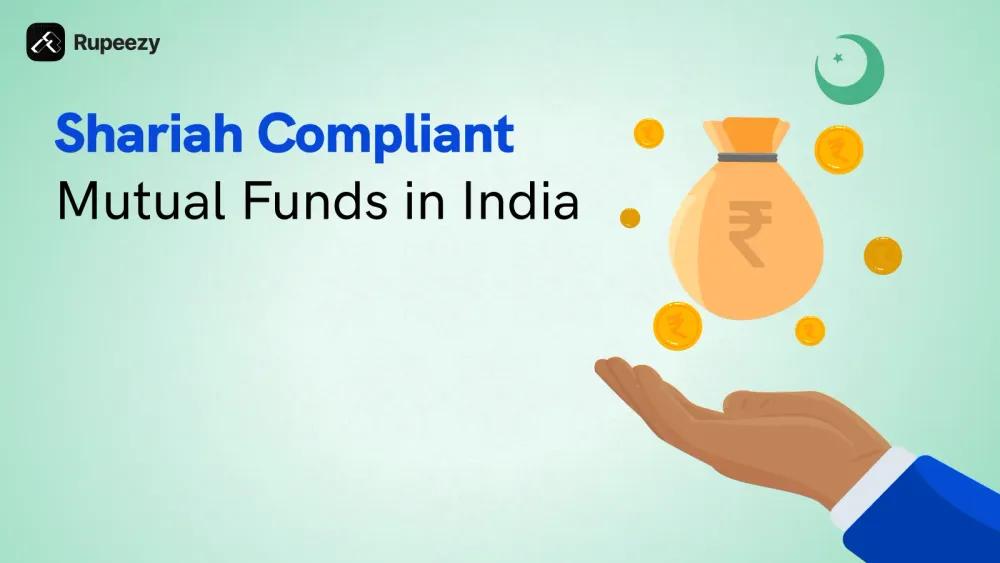Shariah Compliant Mutual Funds (Top Halal Mutual Funds)


00:00 / 00:00
Today, investments can be customised to suit your needs. You can base it on your risk appetite, religious beliefs, or specific industries you prefer. Ultimately, this enables investors to seize opportunities in the growing economy. In this blog, we will explore what Shariah compliant mutual funds are, their features, how to invest in them, how they compare to regular mutual funds, and more. Let’s dive into this to know more.
What are Shariah Compliant Mutual Funds?
Shariah compliant mutual funds are investment funds that operate in accordance with Islamic finance principles under Shariah law. These funds invest only in companies and sectors permitted (Halal) by Islamic guidelines. They are intended for Islamic investors and avoid businesses involved in alcohol, tobacco, weapons, gambling, interest-based finance, and other prohibited activities while strictly adhering to their principles.
Is Mutual Fund Halal?
These Shariah compliant mutual funds can be considered halal if they strictly adhere to Shariah principles. The funds avoid industries like alcohol, gambling, and conventional banking, which are prohibited in Islam. Instead, they focus on ethical investments in sectors like technology, healthcare, and manufacturing. Shariah boards carefully screen these funds to ensure they comply with Islamic law. Interest-based income and risky activities are avoided, focusing on profit and loss sharing and investing in assets with real value. For Muslims seeking halal investment options, these mutual funds offer a way to grow wealth while staying true to their ethics and religion.
Key Features of Shariah Compliant Mutual Funds
Actively Managed: Shariah compliant mutual funds in India actively screen investments to ensure they align with Islamic principles. This involves both positive and negative screening methods to select companies in permissible sectors like technology and healthcare, while excluding those in restricted industries.
Prohibition of Interest: These funds strictly avoid investments that generate income through interest, aligning with the Islamic prohibition on riba (interest).
Purification Procedure: To maintain compliance, these funds undergo a purification process. Any income derived from non-compliant activities is identified, deducted, and donated to charitable organizations.
Investments in Sukuk: Shariah-compliant mutual funds invest in Sukuk, which are Islamic bonds that comply with Shariah principles. Sukuk provides an alternative to conventional fixed-income securities.
Profit-and-Loss Sharing: These funds encourage profit-and-loss sharing arrangements, consistent with Islamic banking principles. This approach promotes equitable risk distribution among stakeholders.
Factors to Consider Before Investing in Shariah Compliant Mutual Funds
Returns: Shariah compliant funds often deliver competitive returns compared to conventional funds, but their performance depends on market conditions and adherence to Islamic principles.
Limited Investment Options: These funds exclude industries such as alcohol, gambling, and conventional banking, narrowing diversification opportunities compared to traditional funds.
Liquidity: Limited investment options and restrictions on trading certain assets can impact liquidity, making it essential for investors to assess ease of entry and exit.
Higher Costs: The rigorous screening and compliance processes required for Shariah adherence often result in higher management fees and operational expenses.
Restrictive Decision-Making: Fund managers may face constraints in decision-making due to adherence to Islamic principles, which can influence flexibility and fund performance.
Benefits of Investing in Halal Mutual Funds
Investing in Halal Mutual Funds offers several benefits, such as:
Ethical Peace of Mind: These funds ensure that investments are made in ethical and socially responsible avenues that align with Islamic principles, providing peace of mind for investors.
Diversification: Despite restrictions, Halal Mutual Funds can offer diversified portfolios across various sectors, reducing risk and improving potential returns.
Robust Screening: Investments undergo rigorous screening process to ensure compliance with Shariah principles, evaluating both financial and ethical aspects.
Conservative Approach: Halal mutual funds encourage long term investing, and discourage short-term speculation, appealing to risk-averse investors.
Social Responsibility: These funds prioritize social responsibility by avoiding investments in harmful industries, appeal to socially conscious investors.
Shariah Mutual Funds vs Regular Mutual Funds
We will look at the comparison between Shariah Mutual Funds and Regular Mutual Funds in the table below.
Feature | Shariah-Compliant Mutual Funds | Regular Mutual Funds |
Investment Philosophy | Invests based on Islamic principles, excluding prohibited industries like alcohol, tobacco, and gambling. | Invests in a wide range of sectors without specific religious restrictions. |
Screening Process | Uses both positive and negative screening to ensure Shariah compliance. | Does not have a specific religious screening process. |
Debt and Leverage | Avoids companies with high debt levels. | May invest in companies with significant debt. |
Interest Income | Limits investment in high-interest income companies (typically up to 3% of total income). | There are no restrictions on interest income. |
Shariah Board Oversight | Managed under the supervision of a Shariah board to ensure compliance. | There is no Shariah board oversight in regular mutual funds. |
Purification Process | Undergoes a purification process to cleanse non-compliant income. | No purification process is required. |
Investment Instruments | Focuses on asset-backed investments and Sukuk. | Invests in a broader range of securities, including conventional bonds. |
Risk Management | Emphasizes ethical and socially responsible investing, which can reduce certain risks. | May have a higher risk due to broader investment options. |
List of Halal Mutual Funds in India
1. Tata Ethical Fund
Tata Ethical Fund was relaunched on August 5, 1996 under the Tata Mutual Fund. It is an equity-themed fund adhering to Shariah principles. As of April 9, 2025, its Net Asset Value (NAV) stands approximately at Rs. 394.92 per unit with an expense ratio of 0.68% and a 0.50% exit load if redeemed within 90 days from the investment date. The fund's top holdings include Tata Consultancy Services Ltd. (5.58%), Hindustan Unilever Ltd. (4.18%), HCL Technologies Ltd. (3.87%), SRF Ltd. (3.42%), and Ultratech Cement Ltd. (2.79%). It has a fund size of Rs. 2,981 crore and has delivered returns of -0.30% over one year and 21.07% over five years. The fund has invested in sectors like Technology (19%), Healthcare Services (16.8%), Consumer Staples (13.2%) and others.
2. Taurus Ethical Fund
Taurus Ethical Fund was launched on March 20, 2009. It is an equity-themed fund adhering to Shariah principles. As of April 9, 2025, its NAV is approximately Rs. 127.06 with an expense ratio of 1.64% and a 1% exit load if redeemed within 365 days from the investment date. The fund's top holdings include Reliance Industries Ltd. (9.74%), Infosys Ltd. (7.38%), Samvardhana Motherson International Ltd. (3.68%), HCL Technologies Ltd. (3.63%), and Tata Consultancy Services Ltd. (3.50%). It has an Asset Under Management (AUM) of Rs. 251.45 crore and has delivered returns of -4.29% over one year and 20.76% over five years. The fund has primarily invested in sectors like Energy (21.2%), Technology (20.4%), Healthcare (12.1%), and others.
3. Quantum Ethical Fund
Quantum Ethical Fund was launched recently on December 20, 2024. It is an equity-themed fund adhering to Shariah principles. As of April 9, 2025, its Net Asset Value (NAV) stands approximately at Rs. 8.80 per unit with an expense ratio of 0.74% and a 1% exit load for an excess of 10% of investment redeemed within 365 days from the investment date. The fund's top holdings include Marico Ltd. (4.63%), Castrol India Ltd. (3.61%), Infosys Ltd. (3.42%), Wipro Ltd. (3.29%), and Persistent Systems Ltd. (3.27%). It has a fund size of Rs. 44.96 crore and since its inception, it has delivered returns of -12%. The fund has invested in sectors like Technology (23.3%), Other Sectors (22.8%), Automobile (20.9%) and others.
4. Nippon India ETF Shariah BeEs
Nippon India ETF Shariah BeEs is an Exchange Traded Fund (ETF) that follows the Nifty 50 Shariah Index by investing in various companies within that index. Investments in these securities are made in proportion to the index. It is suited for medium to long-term investors seeking capital appreciation. This investment requires a Demat account. Although, it is not a Mutual Fund, it is an ETF that adheres to the Shariah Principles. As of April 9, 2025, it has an AUM of approximately Rs. 32 crore with an expense ratio of 0.96 for Rs. 417.66 per piece.
Returns of Shariah Compliant Mutual Funds
Here's a comparison of the returns for Tata Ethical Mutual Fund and Taurus Ethical Mutual Fund in the table below. We will exclude Quantum Ethical Fund returns due to its recent inception.
Fund Name | 1 Year Return | 3-Year Return | 5-Year Return |
Tata Ethical Fund | -3.33% | 7.72% | 21.07% |
Taurus Ethical Fund | -4.29% | 10.59% | 20.76% |
(Note: The above information is considered as of April 9, 2025.)
How to Invest in a Shariah Compliant Mutual Fund?
Investors seeking opportunities to grow wealth with economic growth can consider investing in these ethical mutual funds. This allows them to benefit from a company's growth and performance with smaller investment amounts. Platforms like the Rupeezy App offer options to start investing after completing KYC and other formalities.
Who Should Consider Halal Investment Options
Halal investment options are ideal for individuals seeking ethical and Shariah-compliant financial growth. Muslims often consider halal investments to align with their financial practices and principles, avoiding industries like alcohol, gambling, and interest-based services.
Non-Muslims can also explore halal investing for its focus on socially responsible and ethical ventures. Halal investments in India appeal to those who value transparency, fairness, and community-oriented wealth-building. It suits investors looking for alternatives like stocks, real estate, sukuk, and precious metals that comply with Islamic laws. These funds are open to all investors.
Conclusion
As we near the end of the blog, we have looked at Shariah-compliant mutual funds that provide investors with an ethical way to grow wealth while following Islamic principles. These funds avoid prohibited industries and focus on socially responsible investing. By aligning their financial goals with ethical and religious values, investors can diversify their portfolios, achieve competitive returns, and invest with peace of mind. Investors need to analyze and assess their risk appetite before investing or consult a financial advisor to understand the risks.
FAQs
Q. Which mutual fund is Shariah compliant?
Ans: Tata Ethical Fund, Taurus Ethical Fund, Quantum Ethical Fund, and Nippon India ETF Shariah BeEs are compliant.
Q. Which mutual funds allowed in Islam?
Ans: Funds following Shariah guidelines, avoiding prohibited industries and interest-based income, are allowed.
Q. Is SIP halal or haram in Islam?
Ans: SIP is halal if invested in Shariah-compliant funds, avoiding prohibited sectors and interest.
Q. Which is the best halal SIP in India?
Ans: Tata Ethical Fund, Taurus Ethical Fund, and Quantum Ethical Fund are popular options for halal SIP investments.
Check Out These Related Articles |
The content on this blog is for educational purposes only and should not be considered investment advice. While we strive for accuracy, some information may contain errors or delays in updates.
Mentions of stocks or investment products are solely for informational purposes and do not constitute recommendations. Investors should conduct their own research before making any decisions.
Investing in financial markets are subject to market risks, and past performance does not guarantee future results. It is advisable to consult a qualified financial professional, review official documents, and verify information independently before making investment decisions.

All Category









